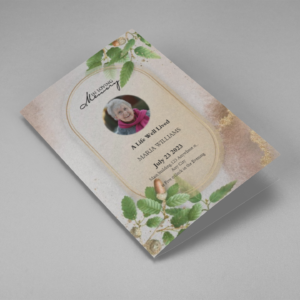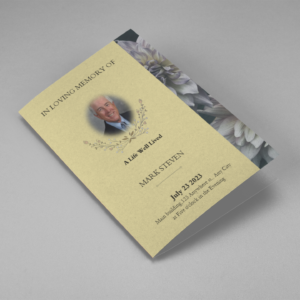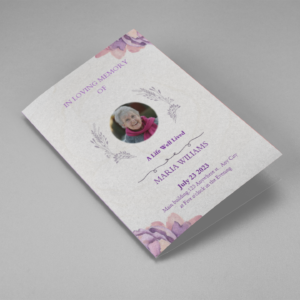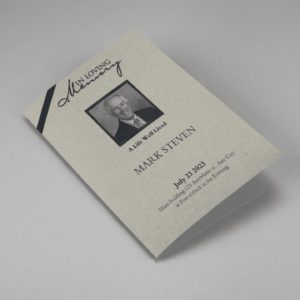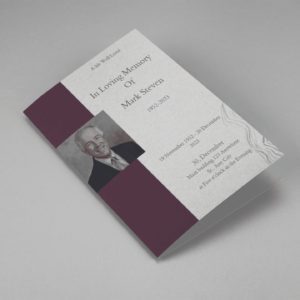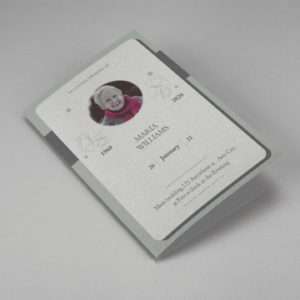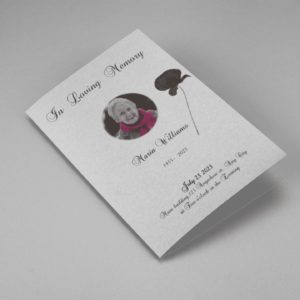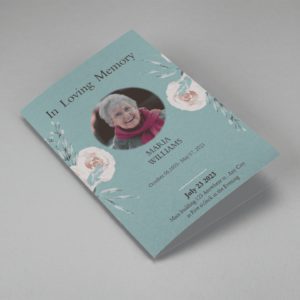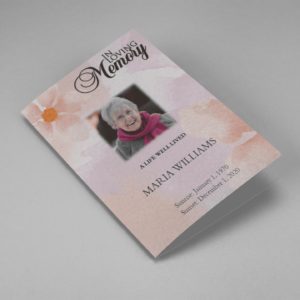When planning a funeral, writing an obituary is an essential step in honoring the deceased’s life and legacy. However, many people wonder if an obituary holds any legal value. While obituaries are widely used in funeral programs and memorials, they do not serve as official legal documents. Understanding the role of obituaries and how they differ from legal records can help families navigate the funeral planning process more effectively.
What is an Obituary?
An obituary is a public announcement of a person’s death, typically published in newspapers, online memorial sites, or funeral programs. It provides essential information such as:
- The deceased’s full name, date of birth, and date of passing
- Details about their family, including surviving and predeceased relatives
- A brief biography, highlighting their accomplishments and legacy
- Information about the funeral or memorial service
While an obituary is an important tribute, it does not serve as an official death record.
Legal Documents vs. Obituaries
A legal document serves as an official record recognized by government authorities. The key legal documents related to death include:
- Death Certificate: Issued by the state, this document is required for legal matters such as estate settlement and insurance claims.
- Will and Testament: Outlines how the deceased’s assets should be distributed.
- Probate Documents: Necessary for estate administration.
- Burial or Cremation Permit: Authorizes the final disposition of remains.
Unlike these documents, an obituary is purely informational and holds no legal authority.
How an Obituary Helps in Funeral Planning
Although not legally binding, an obituary plays a crucial role in funeral arrangements. Here’s how an example of an obituary can be useful:
1. Guides Family Members in Writing an Obituary
Creating an obituary from scratch can be overwhelming. Looking at an example obituary provides:
- A structured format to follow
- Guidance on what details to include
- Inspiration for personalized tributes
2. Helps in Creating a Funeral Program
A funeral program often includes an obituary to inform attendees about the deceased’s life. A well-crafted obituary serves as:
- A written keepsake for family and friends
- A guide for eulogists and speakers at the service
- A heartfelt tribute reflecting the deceased’s journey
3. Serves as a Public Notification
An obituary helps notify the public about the passing, ensuring that friends, colleagues, and extended family are informed about funeral details. This is particularly useful for those who may not have received direct communication from the family.
4. Assists in Estate Settlements
While an obituary is not a legal document, it can support estate processes in the following ways:
- It provides public notice of death, which may be useful for creditors and business associates.
- It helps legal representatives cross-check information when managing wills and estates.
5. Aids in Genealogy and Historical Records
Genealogists and historians use obituaries to trace family histories. For future generations, an obituary serves as a documented legacy that preserves family details.
Key Elements of an Effective Obituary
To ensure an obituary serves its purpose effectively, it should include:
- Accurate Personal Information: Name, date of birth, and death details.
- Family Details: Names of close relatives.
- Life Achievements: Career, community involvement, and personal milestones.
- Funeral Information: Date, time, and location of services.
- Personal Touch: A meaningful message or quote to honor the deceased.
While an obituary is a significant component of funeral planning, it does not serve as a legal document. However, its value in commemorating a loved one’s life, guiding family members, and assisting with funeral program creation cannot be overstated. By using an example of obituary as a reference, families can craft a heartfelt tribute that truly honors the memory of their loved one.
Funeral Obituary Templates
-
Searching for a Oak Leaf With Gold Oval Frame Half Page Funeral Program that is easy to print and amass and has a cutting-edge look? The Oak Leaf With Gold Oval Frame Half Page Funeral Program is the Perfect decision because it measures 8.5”x 5.5”.
- No Limitation on Content, Edit anything
- Edit anytime – unlimited revisions even after purchased
- Get a printable PDF downloaded to get it printed on your own.
-
Searching for a Brown and White Classic Funeral Program Half Page Program that is easy to print and amass and has a cutting-edge look? The Brown and White Classic Funeral Program Half Page Program is the Perfect decision because it measures 8.5”x 5.5”.
- No Limitation on Content, Edit anything
- Edit anytime – unlimited revisions even after purchased
- Get a printable PDF downloaded to get it printed on your own.
-
Searching for a Purple Elegant Watercolor Half Page Funeral Program Template that is easy to print and amass and has a cutting-edge look? The Purple Elegant Watercolor Half Page Funeral Program Template is the Perfect decision because it measures 8.5”x 5.5”.
- No Limitation on Content, Edit anything
- Edit anytime – unlimited revisions even after purchased
- Get a printable PDF downloaded to get it printed on your own.
-
Searching for a Cream and Green Photo Obituary Half Page Program that is easy to print and amass and has a cutting-edge look? The Cream and Green Photo Obituary Half Page Program is the Perfect decision because it measures 8.5”x 5.5”.
- No Limitation on Content, Edit anything
- Edit anytime – unlimited revisions even after purchased
- Get a printable PDF downloaded to get it printed on your own.
-
Searching for a Cream Simple Elegant Photo Church Half Page Program that is easy to print and amass and has a cutting-edge look? The Cream Simple Elegant Photo Church Half Page Program is the Perfect decision because it measures 8.5”x 5.5”.
- No Limitation on Content, Edit anything
- Edit anytime – unlimited revisions even after purchased
- Get a printable PDF downloaded to get it printed on your own.
-
Searching for a Samovar Silver Half Page Funeral Program Template that is easy to print and amass and has a cutting-edge look? The Samovar Silver Half Page Funeral Program Template is the Perfect decision because it measures 8.5”x 5.5”.
- No Limitation on Content, Edit anything
- Edit anytime – unlimited revisions even after purchased
- Get a printable PDF downloaded to get it printed on your own.
-
Searching for an Elegant Beige Half Page Funeral Program Template that is easy to print and amass and has a cutting-edge look? The Elegant Beige Half-Page Funeral Program Template is the Perfect decision because it measures 8.5”x 5.5”.
- No Limitation on Content, Edit anything
- Edit anytime – unlimited revisions even after purchased
- Get a printable PDF downloaded to get it printed on your own.
-
Searching for a White Floral Pro Half Page Funeral Program Template that is easy to print and amass and has a cutting-edge look? White Floral Pro Half Page Funeral Program Template is the Perfect decision because it measures 8.5”x 5.5”.
- No Limitation on Content, Edit anything
- Edit anytime – unlimited revisions even after purchased
- Get a printable PDF downloaded to get it printed on your own.
-
Searching for a Grey and Burgundy Elegant Half Page Funeral Program Template that is easy to print and amass and has a cutting-edge look? Grey and Burgundy Elegant Half Page Funeral Program Template is the Perfect decision because it measures 8.5”x 5.5”.
- No Limitation on Content, Edit anything
- Edit anytime – unlimited revisions even after purchased
- Get a printable PDF downloaded to get it printed on your own.
-
Searching for a Soft Green and Grey Minimalist Floral Half Page Funeral Program Template that is easy to print and amass and has a cutting-edge look? Soft Green and Grey Minimalist Floral Half Page Funeral Program Template is the Perfect decision because it measures 8.5”x 5.5”.
- No Limitation on Content, Edit anything
- Edit anytime – unlimited revisions even after purchased
- Get a printable PDF downloaded to get it printed on your own.
-
Searching for a Gray Elegant Oval Frame Half Page Funeral Program Template that is easy to print and amass and has a cutting-edge look? Gray Elegant Oval Frame Half Page Funeral Program Template is the Perfect decision because it measures 8.5”x 5.5”.
- No Limitation on Content, Edit anything
- Edit anytime – unlimited revisions even after purchased
- Get a printable PDF downloaded to get it printed on your own.
-
Searching for a Blue Organic Minimal Half Page Funeral Program Template that is easy to print and amass and has a cutting-edge look? Blue Organic Minimal Half Page Funeral Program Template is the Perfect decision because it measures 8.5”x 5.5”.
- No Limitation on Content, Edit anything
- Edit anytime – unlimited revisions even after purchased
- Get a printable PDF downloaded to get it printed on your own.
-
Searching for a Pink and Orange Watercolour Half Page Funeral Program Template that is easy to print and amass and has a cutting-edge look? Pink and Orange Watercolour Half Page Funeral Program Template is the Perfect decision because it measures 8.5”x 5.5”.
- No Limitation on Content, Edit anything
- Edit anytime – unlimited revisions even after purchased
- Get a printable PDF downloaded to get it printed on your own.
-
Searching for a Pink Floral Paper Half Page Funeral Program Template that is easy to print and amass and has a cutting-edge look? Pink Floral Paper Half Page Funeral Program Template is the Perfect decision because it measures 8.5”x 5.5”.
- No Limitation on Content, Edit anything
- Edit anytime – unlimited revisions even after purchased
- Get a printable PDF downloaded to get it printed on your own.
Funeral Programs : Helping Videos
Frequently Asked Question On Can An Obituary Be Used As A Legal Document
Is an obituary a legally recognized document?
No, an obituary is not a legal document. It serves as a public announcement and tribute but does not hold legal authority.
Can an obituary be used as proof of death?
No, a death certificate issued by the state is the only official proof of death.
Do I need a lawyer to write an obituary?
No, writing an obituary is a personal and family-driven process. However, legal matters related to the deceased’s estate require legal documentation.
Can an obituary help with estate settlement?
While not legally binding, an obituary can help identify the deceased’s relationships and provide notice to creditors and associates.3


